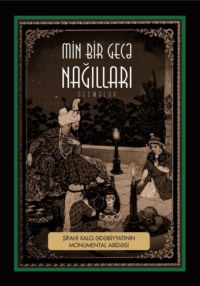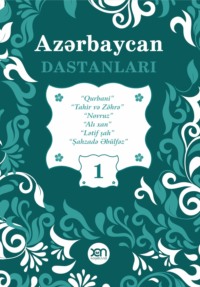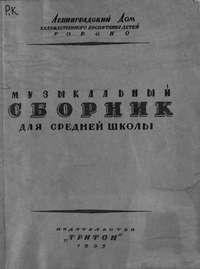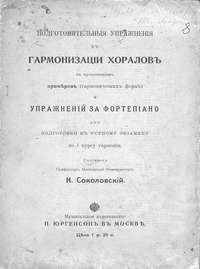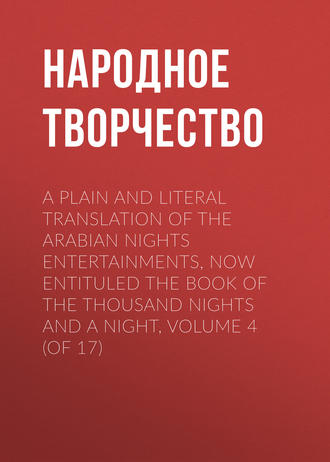 полная версия
полная версияA plain and literal translation of the Arabian nights entertainments, now entituled The Book of the Thousand Nights and a Night, Volume 4 (of 17)
She said, It hath reached me, O auspicious King, that the Caliph ordered Calamity Ahmad, saying, “I charge thee fetch him to me;” and the other replied, “To hear is to obey;” whereupon the Caliph bade them give him ten thousand gold pieces and he fared forth for Alexandria. On this wise it happed with Aslan; but as regards his father, Ala al-Din Abu al-Shamat, he sold in course of time all that was in his shop excepting a few things and amongst them a long bag of leather. And happening to shake the bag there fell out a jewel which filled the palm of the hand, hanging to a chain of gold and having many facets but especially five, whereon were names and talismanic characters, as they were ant-tracks. So he rubbed each face; but none answered him115 and he said to himself, “Doubtless it is a piece of variegated onyx;” and then hung it up in the shop. And behold, a Consul116 passed along the street; and, raising his eyes, saw the jewel hanging up; so he seated himself over against the shop and said to Ala al-Din, “O my lord, is the jewel for sale?” He answered, “All I have is for sale.” Thereupon the Frank said, “Wilt thou sell me that same for eighty thousand dinars?” “Allah open!” replied Ala al-Din. The Frank asked, “Wilt thou sell it for an hundred thousand dinars?”; and he answered, “I sell it to thee for a hundred thousand dinars; pay me down the monies.” Quoth the Consul, “I cannot carry about such sum as its price, for there be robbers and sharpers in Alexandria; but come with me to my ship and I will pay thee the price and give thee to boot a bale of Angora wool, a bale of satin, a bale of velvet and a bale of broadcloth.” So Ala al-Din rose and locked up his shop, after giving the jewel to the Frank, and committed the keys to his neighbour, saying, “Keep these keys in trust for me, whilst I go with this Consul to his ship and return with the price of my jewel. If I be long absent and there come to thee Ahmad al-Danaf, the Captain who stablished in this shop, give him the keys and tell him where I am.” Then he went with the Consul to his ship and no sooner had he boarded it than the Frank set him a stool and, making him sit down, said to his men, “Bring the money.” So they brought it and he paid him the price of the jewel and gave him the four bales he had promised him and one over; after which he said to him, “O my lord, honour me by accepting a bite or a sup” And Ala al-Din answered, “If thou have any water, give me to drink.” So the Frank called for sherbets and they brought drink drugged with Bhang, of which no sooner had Ala al-Din drunk, than he fell over on his back; whereupon they stowed away the chairs and shipped the shoving-poles and made sail. Now the wind blew fair for them till it drove them into blue water; and when they were beyond sight of land the Kaptán117 bade bring Ala al-Din up out of the hold and made him smell the counter-drug of Bhang; whereupon he opened his eyes and said, “Where am I?” He replied, “Thou art bound and in my power and if thou hadst said, Allah open! to an hundred thousand dinars for the jewel, I would have bidden thee more.” “What art thou?” asked Ala al-Din, and the other answered, “I am a sea-captain and mean to carry thee to my sweetheart.” Now as they were talking, behold, a ship hove in sight carrying forty Moslem merchants; so the Frank captain attacked the vessel and made fast to it with grappling-irons; then he boarded it with his men and took it and plundered it; after which he sailed on with his prize, till he reached the city of Genoa. There the Kaptan, who was carrying off Ala al-Din, landed and repaired to a palace whose postern gave upon the sea, and behold, there came down to him a damsel in a chin-veil who said, “Hast thou brought the jewel and the owner?” “I have brought them both,” answered he; and she said, “Then give me the jewel.” So he gave it to her; and, returning to the port, fired his cannon to announce his safe return; whereupon the King of the city, being notified of that Kaptan’s arrival, came down to receive him and asked him, “How hath been this voyage?” He answered, “A right prosperous one, and while voyaging I have made prize of a ship with one-and forty Moslem merchants.” Said the King, “Land them at the port:” so he landed the merchants in irons and Ala al-Din among the rest; and the King and the Kaptan mounted and made the captives walk before them till they reached the audience-chamber, when the Franks seated themselves and caused the prisoners to pass in parade order, one by one before the King who said to the first, “O Moslem, whence comest thou?” He answered, “From Alexandria;” whereupon the King said, “O headsman, put him to death.” So the sworder smote him with the sword and cut off his head: and thus it fared with the second and the third, till forty were dead and there remained but Ala al-Din, who drank the cup of his comrades’ sighs and agony and said to himself, “Allah have mercy on thee, O Ala al-Din. Thou art a dead man.” Then said the King to him, “And thou, what countryman art thou?” He answered, “I am of Alexandria,” and the King said, “O headsman, strike off his head.” So the sworder raised arm and sword, and was about to strike, when behold, an old woman of venerable aspect presented herself before the King, who rose to do her honour, and said to him, “O King, did I not bid thee remember, when the Captain came back with captives, to keep one or two for the convent, to serve in the church?” The King replied, “O my mother, would thou hadst come a while earlier! But take this one that is left.” So she turned to Ala al-Din and said to him, “Say, wilt thou serve in the church, or shall I let the King slay thee?” Quoth he, “I will serve in the church.” So she took him and carried him forth of the court and went to the church, where he said to her, “What service must I do?” She replied, “Thou must rise with the dawn and take five mules and go with them to the forest and there cut dry fire-wood and saw it short and bring it to the convent-kitchen. Then must thou take up the carpets and sweep and wipe the stone and marble pavements and lay the carpets down again, as they were; after which thou must take two bushels and a half of wheat and bolt it and grind it and knead it and make it into cracknels118 for the convent; and thou must take also a bushel of lentils119 and sift and crush and cook them. Then must thou fetch water in barrels and fill the four fountains; after which thou must take three hundred and threescore and six wooden bowls and crumble the cracknels therein and pour of the lentil-pottage over each and carry every monk and patriarch his bowl.” Said Ala al-Din,120 “Take me back to the King and let him kill me, it were easier to me than this service.” Replied the old woman, “If thou do truly and rightly the service that is due from thee thou shalt escape death; but, if thou do it not, I will let the King kill thee.” And with these words Ala al-Din was left sitting heavy at heart. Now there were in the church ten blind cripples, and one of them said to him, “Bring me a pot.” So he brought it him and he cacked and eased himself therein and said, “Throw away the ordure.” He did so, and the blind man said, “The Messiah’s blessing be upon thee, O servant of the church!” Presently behold, the old woman came in and said to him, “Why hast thou not done thy service in the church?” Answered he, “How many hands have I, that I should suffice for all this work?” She rejoined, “Thou fool, I brought thee not hither except to work;” and she added, “Take, O my son, this rod (which was of copper capped with a cross) and go forth into the highway and, when thou meetest the governor of the city, say to him: – I summon thee to the service of the church, in the name of our Lord the Messiah. And he will not disobey thee. Then make him take the wheat, sift, grind, bolt, knead, and bake it into cracknels; and if any gainsay thee, beat him and fear none.” “To hear is to obey,” answered he and did as she said, and never ceased pressing great and small into his service; nor did he leave to do thus for the space of seventeen years. Now one day as he sat in church lo! the old woman came to him and said, “Go forth of the convent.” He asked, “Whither shall I go?” and she answered, “Thou canst pass the night in a tavern or with one of thy comrades.” Quoth he, “Why dost thou send me forth of the church?” and quoth she, “The Princess Husn Maryam, daughter of Yohanná,121 King of this city, purposeth to visit the church and it befitteth not that any abide in her way.” So he made a show of obeying her orders and rose up and pretended that he was leaving the church; but he said in his mind, “I wonder whether the Princess is like our women or fairer than they! At any rate I will not go till I have had a look at her.” So he hid himself in a closet with a window looking into the church and, as he watched, behold, in came the King’s daughter. He cast at her one glance of eyes that cost him a thousand sighs, for he found her like the full moon when it cometh swimming out of the clouds; and he saw with her a young lady – And Shahrazad perceived the dawn of day and ceased to say her permitted say.
Now when it was the Two Hundred and Sixty-eighth Night,She said, It hath reached me, O auspicious King, that when Ala al-Din looked at the King’s daughter, he saw with her a young lady to whom he heard her say, “Thy company hath cheered me, O Zubaydah.” So he looked straitly at the damsel and found her to be none other than his dead wife, Zubaydah the Lutist. Then the Princess said to Zubaydah, “Come, play us an air on the lute.” But she answered, “I will make no music for thee, till thou grant my wish and keep thy word to me.” Asked the Princess, “And what did I promise thee?”; and Zubaydah answered, “That thou wouldst reunite me with my husband Ala al-Din Abu al-Shamat, the Trusty, the Faithful.” Rejoined the Princess, “O Zubaydah, be of good cheer and keep thine eyes cool and clear; play us a piece as a thank-offering and an ear-feast for reunion with thy husband Ala al-Din.” “Where is he?” asked Zubaydah, and Maryam answered, “He is in yonder closet listening to our words.” So Zubaydah played on the lute a melody which had made a rock dance for glee; and when Ala al-Din heard it, his bowels yearned towards her and he came forth from the closet and, throwing himself upon his wife Zubaydah, strained her to his bosom. She also knew him and the twain embraced and fell to the ground in a swoon. Then came forward the Princess Husn Maryam and sprinkled rose-water on them, till they revived when she said to them, “Allah hath reunited you.” Replied Ala al-Din, “By thy kind offices, O lady.” Then, turning to his wife, he said to her, “O Zubaydah, thou didst surely die and we tombed thee in the tomb: how then returnedst thou to life and camest thou to this place?” She answered, “O my lord, I did not die; but an Aun122 of the Jinn snatched me up and flew with me hither. She whom thou buriedst was a Jinniyah, who shaped herself to my shape and feigned herself dead; but when you entombed her she broke open the tomb and came forth from it and returned to the service of this her mistress, the Princess Husn Maryam. As for me I was possessed123 and, when I opened my eyes, I found myself with this Princess thou seest; so I said to her: – Why hast thou brought me hither. Replied she: – I am predestined to marry thy husband, Ala al-Din Abu al-Shamat: wilt thou then, O Zubaydah, accept me to co-consort, a night for me and a night for thee? Rejoined I: – To hear is to obey, O my lady, but where is my husband? Quoth she: – Upon his forehead is written what Allah hath decreed to him; as soon as the writing which is there writ is fulfilled to him, there is no help for it but he come hither, and we will beguile the time of our separation from him with songs and playing upon instruments of music, till it please Allah to unite us with him. So I abode all these days with her till Allah brought us together in this church.” Then Husn Maryam turned to him and said, “O my lord, Ala al-Din, wilt thou be to me baron and I be to the femme?” Quoth he, “O my lady, I am a Moslem and thou art a Nazarene; so how can I intermarry with thee?” Quoth she, “Allah forbid that I should be an infidel! Nay, I am a Moslemah; for these eighteen years I have held fast the Faith of Al-Islam and I am pure of any creed other than that of the Islamite.” Then said he, “O my lady, I desire a return to my native land;” and she replied, “Know that I see written on thy forehead things which thou must needs accomplish, and then thou shalt win to thy will. Moreover, be lief and fain, O Ala al-Din, that there hath been born to thee a son named Aslan; who now being arrived at age of discretion, sitteth in thy place with the Caliph. Know also that Truth hath prevailed and that Falsehood naught availed; and that the Lord hath withdrawn the curtain of secrecy from him who stole the Caliph’s goods, that is, Ahmad Kamakim the arch-thief and traitor; and he now lieth bound and in jail. And know further ‘twas I who sent thee the jewel and had it put in the bag where thou foundest it, and ‘twas I who sent the captain that brought thee and the jewel; for thou must know that the man is enamoured of me and seeketh my favours and would possess me; but I refused to yield to his wishes or let him have his will of me; and I said to him: – Thou shalt never have me till thou bring me the jewel and its owner. So I gave him an hundred purses and despatched him to thee, in the habit of a merchant, whereas he is a captain and a war-man; and when they led thee to thy death after slaying the forty captives, I also sent thee this old woman to save thee from slaughter.” Said he, “Allah requite thee for us with all good! Indeed thou hast done well.” Then Husn Maryam renewed at his hands her profession of Al-Islam; and, when he was assured of the truth of her speech, he said to her, “O my lady, tell me what are the virtues of this jewel and whence cometh it?” She answered, “This jewel came from an enchanted hoard, and it hath five virtues which will profit us in time of need. Now my lady grandmother, the mother of my father, was an enchantress and skilled in solving secrets and finding hidden treasures from one of the which came the jewel into her hands. And as I grew up and reached the age of fourteen, I read the Evangel and other books and I found the name of Mohammed (whom Allah bless and preserve!) in the four books, namely the Evangel, the Pentateuch, the Psalms and the Koran;124 so I believed in Mohammed and became a Moslemah, being certain and assured that none is worship-worth save Allah Almighty, and that to the Lord of all mankind no faith is acceptable save that of Al-Islam. Now when my lady-grandmother fell sick, she gave me this jewel and taught me its five virtues. Moreover, before she died, my father said to her: – Take thy tablets of geomancy and throw a figure, and tell us the issue of my affair and what will befal me. And she foretold him that the far-off one125 should die, slain by the hand of a captive from Alexandria. So he swore to kill every prisoner from that place and told the Kaptan of this, saying: – There is no help for it but thou fall on the ships of the Moslems and seize them and whomsoever thou findest of Alexandria, kill him or bring him to me. The Captain did his bidding until he had slain as many in number as the hairs of his head. Then my grandmother died and I took a geomantic tablet, being minded and determined to know the future, and I said to myself: – Let me see who will wed me! Whereupon I threw a figure and found that none should be my husband save one called Ala al-Din Abu al-Shamat, the Trusty, the Faithful. At this I marvelled and waited till the times were accomplished and I foregathered with thee.” So Ala al-Din took her to wife and said to her, “I desire to return to my own country.” Quoth she, “If it be so, rise up and come with me.” Then she took him and, hiding him in a closet of her palace, went in to her father, who said to her, “O my daughter, my heart is exceeding heavy this day; sit down and let us make merry with wine, I and thou.” So she sat down with him and he called for a table of wine; and she plied him till he lost his wits, when she drugged a cup with Bhang and he drank it off and fell upon his back. Then she brought Ala al-Din out of the closet and said to him, “Come; verily thine enemy lieth prostrate, for I made him drunk and drugged him; so do thou with him as thou wilt.” Accordingly Ala al-Din went to the King and, finding him lying drugged and helpless, pinioned him fast and manacled and fettered him with chains. Then he gave him the counter-drug and he came to himself – And Shahrazad perceived the dawn of day and ceased saying her permitted say.
Now when it was the Two Hundred and Sixty-ninth Night,She said, It hath reached me, O auspicious King, that Ala al-Din gave the antidote of Bhang to King Yohanna, father of Husn Maryam, and he came to himself and found Ala al-Din and his daughter sitting on his breast. So he said to her, “O my daughter, dost thou deal thus with me?” She answered “If I be indeed thy daughter, become a Moslem, even as I became a Moslemah; for the truth was shown to me and I attested it; and the false, and I deserted it. I have submitted myself unto Allah, The Lord of the Three Worlds, and am pure of all faiths contrary to that of Al-Islam in this world and in the next world. Wherefore, if thou wilt become a Moslem, well and good; if not, thy death were better than thy life.” Ala al-Din also exhorted him to embrace the True Faith; but he refused and was contumacious; so Ala al-Din drew a dagger and cut his throat from ear to ear.126 Then he wrote a scroll, setting forth what had happened and laid it on the brow of the dead; after which they took what was light of load and weighty of worth and turned from the palace and returned to the church. Here the Princess drew forth the jewel and, placing her hand upon the facet where was figured a couch, rubbed it; and behold, a couch appeared before her and she mounted upon it with Ala al-Din and his wife, Zubaydah, the Lutist, saying, “I conjure thee by the virtue of the names and talismans and characts engraven on this jewel, rise up with us, O Couch!” And it rose with them into the air and flew, till it came to a Wady wholly bare of growth, when the Princess turned earthwards the facet on which the couch was figured, and it sank with them to the ground. Then she turned up the face whereon was fashioned a pavilion and tapping it said, “Let a pavilion be pitched in this valley;” and there appeared a pavilion, wherein they seated themselves. Now this Wady was a desert waste, without grass or water; so she turned a third face of the jewel towards the sky, and said, “By the virtue of the names of Allah, let trees upgrow here and a river flow beside them!” And forthwith trees sprang up and by their side ran a river plashing and dashing. They made the ablution and prayed and drank of the stream; after which the Princess turned up the three other facets till she came to the fourth, whereon was portrayed a table of food, and said, “By the virtue of the names of Allah, let the table be spread!” And behold, there appeared before them a table, spread with all manner of rich meats, and they ate and drank and made merry and were full of joy. Such was their case; but as regards Husn Maryam’s father, his son went in to waken him and found him slain; and, seeing Ala al-Din’s scroll, took it and read it, and readily understood it. Then he sought his sister and finding her not, betook himself to the old woman in the church, of whom he enquired for her, but she said, “Since yesterday I have not seen her.” So he returned to the troops and cried out, saying, “To horse, ye horsemen!” Then he told them what had happened, so they mounted and rode after the fugitives, till they drew near the pavilion. Presently Husn Maryam arose and looked up and saw a cloud of dust which spread till it walled the view, then it lifted and flew, and lo! stood disclosed her brother and his troops, crying aloud, “Whither will ye fly, and we on your track!” Then said she to Ala al-Din, “Are thy feet firm in fight?” He replied, “Even as the stake in bran, I know not war nor battle, nor swords nor spears.” So she pulled out the jewel and rubbed the fifth face, that on which were graven a horse and his rider, and behold, straightway a cavalier appeared out of the desert and ceased not to do battle with the pursuing host and smite them with the sword, till he routed them and put them to flight. Then the Princess asked Ala al-Din, “Wilt thou go to Cairo or to Alexandria?”; and he answered, “To Alexandria.” So they mounted the couch and she pronounced over it the conjuration, whereupon it set off with them and, in the twinkling of an eye, brought them to Alexandria. They alighted without the city and Ala al-Din hid the women in a cavern, whilst he went into Alexandria and fetched them outer clothing, wherewith he covered them. Then he carried them to his shop and, leaving them in the “ben”127 walked forth to fetch them the morning-meal, and behold, he met Calamity Ahmad who chanced to be coming from Baghdad. He saw him in the street and received him with open arms, saluting him and welcoming him. Whereupon Ahmad al-Danaf gave him the good news of his son Aslan and how he was now come to the age of twenty: and Ala al-Din, in his turn, told the Captain of the Guard all that had befallen him from first to last, whereat he marvelled with exceeding marvel. Then he brought him to his shop and sitting-room where they passed the night; and next day he sold his place of business and laid its price with other monies. Now Ahmad al-Danaf had told him that the Caliph sought him; but he said, “I am bound first for Cairo, to salute my father and mother and the people of my house.” So they all mounted the couch and it carried them to Cairo the God-guarded; and here they alighted in the street called Yellow,128 where stood the house of Shams al-Din. Then Ala al-Din knocked at the door, and his mother said, “Who is at the door, now that we have lost our beloved for evermore?” He replied, “’Tis I! Ala al-Din!” whereupon they came down and embraced him. Then he sent his wives and baggage into the house and entering himself with Ahmad al-Danaf, rested there three days, after which he was minded to set out for Baghdad. His father said, “Abide with me, O my son;” but he answered, “I cannot bear to be parted from my child Aslan.” So he took his father and mother and fared forth for Baghdad. Now when they came thither, Ahmad al-Danaf went in to the Caliph and gave him the glad tidings of Ala al-Din’s arrival and told him his story; whereupon the King went forth to greet him taking the youth Aslan, and they met and embraced each other. Then the Commander of the Faithful summoned the arch-thief Ahmad Kamakim and said to Ala al-Din, “Up and at thy foe!” So he drew his sword and smote off Ahmad Kamakim’s head. Then the Caliph held festival for Ala al-Din and, summoning the Kazis and witnesses, wrote the contract and married him to the Princess Husn Maryam; and he went in unto her and found her an unpierced pearl. Moreover, the Caliph made Aslan Chief of the Sixty and bestowed upon him and his father sumptuous dresses of honour; and they abode in the enjoyment of all joys and joyance of life, till there came to them the Destroyer of delights and the Sunderer of societies. But the tales of generous men are manifold and amongst them is the story of
HATIM OF THE TRIBE OF TAYY
It is told of Hátim of the tribe of Tayy,129 that when he died, they buried him on the top of a mountain and set over his grave two troughs hewn out of two rocks and stone girls with dishevelled hair. At the foot of the hill was a stream of running water, and when wayfarers camped there, they heard loud crying and keening in the night, from dark till daybreak; but when they arose in the morning, they found nothing but the girls carved in stone. Now when Zú ‘l-Kurá’a,130 King of Himyar, going forth of his tribe, came to that valley, he halted to pass the night there – And Shahrazad perceived the dawn of day and ceased saying her permitted say.
Now when it was the Two Hundred and Seventieth Night,She said, It hath reached me, O auspicious King, that when Zu ‘l-Kura’a passed by the valley he nighted there; and, when he drew near the mountain, he heard the keening and said, “What lamenting is that on yonder hill?” They answered him, saying, “Verily this be the tomb of Hatim al-Táyyi over which are two troughs of stone and stone figures of girls with dishevelled hair; and all who camp in this place by night hear this crying and keening.” So he said jestingly, “O Hatim of Tayy! we are thy guests this night, and we are lank with hunger.” Then sleep overcame him, but presently he awoke in affright and cried out, saying, “Help, O Arabs! Look to my beast!” So they came to him, and finding his she-camel struggling and struck down, they stabbed her in the throat and roasted her flesh and ate. Then they asked him what had happened and he said, “When I closed my eyes, I saw in my sleep Hatim of Tayy who came to me sword in hand and cried: – Thou comest to us and we have nothing by us. Then he smote my she-camel with his sword, and she had surely died even though ye had not come to her and slaughtered her.”131 Now when morning dawned the King mounted the beast of one of his companions and, taking the owner up behind him, set out and fared on till midday, when they saw a man coming towards them, mounted on a camel and leading another, and said to him, “Who art thou?” He answered, “I am Adi,132 son of Hatim of Tayy; where is Zu ‘l-Kura’a, Emir of Himyar?” Replied they, “This is he;” and he said to the prince, “Take this she-camel in place of thy beast which my father slaughtered for thee.” Asked Zu ‘l-Kura’a, “Who told thee of this?” and Adi answered, “My father appeared to me in a dream last night and said to me: – Harkye, Adi; Zu ‘l-Kura’a King of Himyar, sought the guest-rite of me and I, having naught to give him, slaughtered his she-camel, that he might eat: so do thou carry him a she-camel to ride, for I have nothing.” And Zu ‘l-Kura’a took her, marvelling at the generosity of Hatim of Tayy alive and dead. And amongst instances of generosity is the


